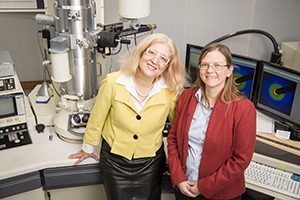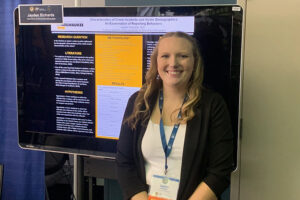Two physicists at the University of Wisconsin-Milwaukee have been awarded a grant of just over a $1 million from the U.S. Department of Energy to develop lithium-ion battery parts made from a unique, patented material called graphene monoxide. Their material dramatically boosts the energy storage capacity of li-ion batteries.
Dr. Carol Hirschmugl and Dr. Marija Gajdardziska-Josifovska, founders of UWM-incubated startup SafeLi LLC, received a Small Business Technology Transfer (STTR) grant to further commercialize the material they created in their physics laboratories.

Electric vehicle manufacturers and drivers want safer, longer-lasting batteries that charge quickly and use new, low-cost materials compatible with battery manufacturing infrastructure. SafeLi will manufacture parts of the batteries, including anodes, that meet all of these requirements.
“Graphene monoxide, a novel nanomaterial that is a 2-D solid crystalline form of carbon monoxide (CO), is the first and only solid form of CO known to mankind which occurs at room temperature and exhibits exciting properties,” said Gajdardziska-Josifovska.
To learn how to bring their research discovery to the market, the physicists joined the Milwaukee I-Corps program, a partnership of five area universities dedicated to turning academic knowledge into products and startups.
Administered by UWM and funded by the National Science Foundation, it’s the only I-Corps site in Wisconsin. Through I-Corps, the team met business mentor Loren Peterson, an entrepreneur in UWM’s Lubar Entrepreneurship Center. The researchers subsequently were accepted into the national I-Corps program, giving them access to interview people in several leading companies interested in battery advancement.
“Our anode material, due to its properties, has the potential to be disruptive in the battery market,” said Hirschmugl. “The I-Corps experience made our startup possible in a way that we never would have expected.”
The current funding is a Phase II grant that follows the successful completion of a Phase I technical and commercial proof-of-concept award. The Phase II grant will support the scaled-up production of graphene monoxide to enable the development of larger prototype batteries relevant for electric vehicles. It will also allow SafeLi to grow to 10 employees and to start pursuing angel, venture and/or corporate capital funding.
This grant brings the total federal and state funding for SafeLi to $1.5 million since the business was launched in December 2016. The company recently competed in the Wisconsin Governor’s Business Plan Competition, winning third prize in the Advanced Manufacturing Division that had more than 60 entrants, and won the first prize at the SEED SPOT pitch competition, co-hosted by the Association for Women in Science.
The STTR grant opportunity is unique, supporting a formal collaboration between SafeLi and UWM in Phase I and Phase II, and fulfilling STTR’s role in bridging the gap between basic science and the commercialization of resulting innovations.
Before becoming entrepreneurs, Hirschmugl and Gajdardziska-Josifovska published hundreds of research articles in peer reviewed journals and secured over $10 million in funding for their research in nanoscience and nanotechnology of oxide materials, surface-bulk interactions, materials synthesis, and electron- and IR-based analysis. Gajdardziska-Josifovska is currently dean of the UWM Graduate School.







